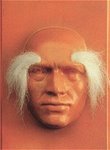
Poker is a hard activity to construct a narrative around.
If you take the standard archetype of a story set around sport (look, we know it is contentious to place poker in the sport bracket but shut up, ok?) it tells a tale of a gang of plucky outsiders/underdogs /criminals who have just finished bottom of the league.
In a fit of devil may care inspiration, the wealthy chairman decides to award one last chance to a down-on-his-stash-coach who used to be brilliant twenty years ago but has had one too many battles with himself/debtors/pterodactyls and is twenty showers away from respectability.
Inevitably, it a redemption tale – the coach stops wearing belts on his arms and the team wins a dramatic final match against the arrogant favourites, usually whilst shoving Charlie Sheen’s bland features on the pitch to the massively inappropriate chorus of ‘Wild Thing’.
The closing image of the pirates triumphing over the preppies exists to sell the American dream.
Leadership, a sense of purpose and a semblance of community can enable even the poorest of shine-boys to battle their way to gold medals.
Poker represents a different side of the American ethos, one which might explain why expert player Brandon Adams chose to call his novella about the game ‘Broke’.
Adams, who recently won a highly respectable $54,144 in a heads up tournament at the WSOP, has a bachelor’s degree in finance and a master’s qualification from the London School of Economics. He is obviously a highly intelligent man and is in little danger of going broke himself, particularly because he has made the wise decision not to submit his book to standard publishers: it only available as a print on demand text.
It attempts to tell the tale of three twenty-something drifters who, in different ways, have a gift for poker, but also have varied forms of self-destruction. Thematically, it is a reasonable idea as it gives Adams a platform to analyse American capitalism through the prism of the glass-edged poker table but, at this stage of his new venture, his dissecting tools are underdeveloped.
He is capable of making some valid observations –
‘It is so American – the way they are so pleased with themselves for wasting their lives. Money is the only recompense they receive for an empty cultural stock.'
– but, not only does he give this line to an Iraqi psychotherapist at the WSOP, he doesn’t realise that this point should be implied and developed through the storyline. Whole chunks of deep philosophical conjecture come from the mouths of ciphers – they are not characters – and never is there any plot development.
The chapters read like posts from blogger and are individually passable but as a whole they are a waste of time.
Maybe that is his point.
He is obviously a highly talented man and he now teaches behavioural science at Harvard. It is possible he regrets dedicating so much time to poker but if he is trying to boost his cultural stock with this mishmash of poker insight and description, he will receive little replenishment as it is a story free zone.


No comments:
Post a Comment